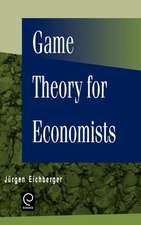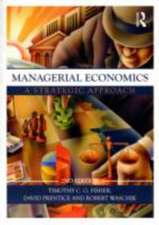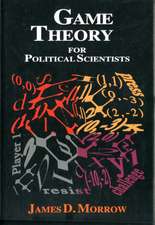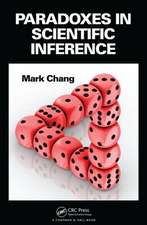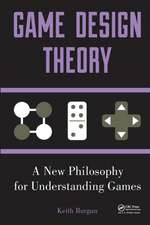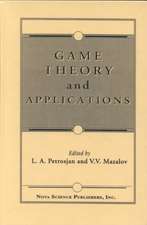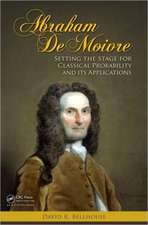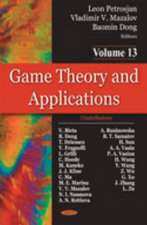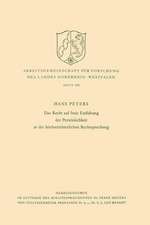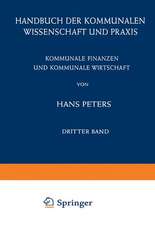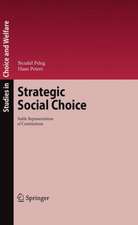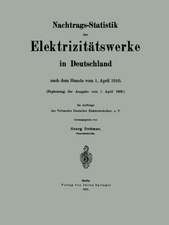Game Theory
Autor Hans Petersen Limba Engleză Paperback – 5 noi 2014
| Toate formatele și edițiile | Preț | Express |
|---|---|---|
| Paperback (2) | 430.00 lei 38-44 zile | |
| Springer – 5 noi 2014 | 430.00 lei 38-44 zile | |
| Springer Berlin, Heidelberg – noi 2016 | 467.05 lei 6-8 săpt. | |
| Hardback (1) | 601.13 lei 6-8 săpt. | |
| Springer Berlin, Heidelberg – 12 iun 2015 | 601.13 lei 6-8 săpt. |
Preț: 430.00 lei
Preț vechi: 530.86 lei
-19% Nou
82.32€ • 84.71$ • 69.39£
Carte tipărită la comandă
Livrare economică 25 februarie-03 martie
Specificații
ISBN-10: 3642426255
Pagini: 384
Dimensiuni: 155 x 235 x 20 mm
Greutate: 0.54 kg
Ediția:2008.
Editura: Springer
Locul publicării:Berlin, Heidelberg, Germany
Public țintă
ResearchCuprins
Thinking Strategically.- Finite Two-Person Zero-Sum Games.- Finite Two-Person Games.- Finite Extensive Form Games.- Finite Games with Incomplete Information.- Noncooperative Games: Extensions.- Repeated Games.- An Introduction to Evolutionary Games.- Cooperative Games with Transferable Utility.- Cooperative Game Theory Models.- Social Choice.- Noncooperative Games.- Matrix Games.- Finite Games.- Extensive Form Games.- Evolutionary Games.- Cooperative Games.- TU-Games: Domination, Stable Sets, and the Core.- The Shapley Value.- Core, Shapley Value, and Weber Set.- The Nucleolus.- Special Transferable Utility Games.- Bargaining Problems.- Tools.- Tools.
Recenzii
“According to Hans Peters, ‘the best introduction to game theory is by means of examples’ and, consequently, the book starts with a set of well-chosen examples illustrating various game theoretic questions from different subfields, which are likely to generate interest … . Summarizing, the book is a perfectly well-presented textbook on classical game theory, written by an expert in the field with high pedagogical skills. It is recommendable for both mathematics and business administration or economic students.” (Walter Kern, Operations Research Letters, Vol. 38, 2010)
Textul de pe ultima copertă
This book presents the basics of game theory both on an undergraduate level and on a more advanced mathematical level. It covers most topics of interest in game theory, including cooperative game theory. Part I presents introductions to all these topics on a basic yet formally precise level. It includes chapters on repeated games, social choice theory, and selected topics such as bargaining theory, exchange economies, and matching. Part II goes deeper into noncooperative theory and treats the theory of zerosum games, refinements of Nash equilibrium in strategic as well as extensive form games, and evolutionary games. Part III covers basic concepts in the theory of transferable utility games, such as core and balancedness, Shapley value and variations, and nucleolus. Some mathematical tools on duality and convexity are collected in Part IV. Every chapter in the book concludes with a problem section. Hints, answers and solutions are included.
Caracteristici
Adapted for the needs of both undergraduate and graduate students
Covers most topics of interest in game theory, including cooperative game theory
Descriere
This book is a compilation of much of the material I used for various game theory courses over, roughly, the past two decades. The ?rst part, ThinkingStrategically, is intended for undergraduatestudents in economics or business, but can also serve as an introduction for the subsequent parts of the book. The second and third parts go deeper into the various topics treated in the ?rst part. These parts are intended for more mathematically oriented undergraduate students, or for graduate students in (for instance) economics. Part II is on noncooperative games and Part III on co- erative games. Part IV is only a mathematical tools chapter. Every chapter has a ?nal section with problems. Selected hints, answers, and solutions to these pr- lems are given at the end of the book. Complete solutions can be obtained from the author. The book claims neither originality nor completeness. As to originality, the material draws heavily on game theory texts developed by many others, often in collaboration. I mention in particular Jean Derks, Thijs Jansen, Andres Perea, Ton Storcken, Frank Thuijsman, Stef Tijs, Dries Vermeulen, and Koos Vrieze. I am also greatly indebted to a large numberof introductory, intermediate, and advancedtexts and textbookson game theory, and hope I have succeeded in giving suf?cient credit to the authors of these works in all relevant places.
Notă biografică
He is Professor of Quantitative Economics, in particular Mathematical Economics, at the Department of Quantitative Economics, School of Business and Economics, Maastricht University. He is also Honorar Professor at the Rheinisch-Westfälische Technische Hochschule, Aachen, Germany.
He is a Fellow of the Society for the Advancement of Economic Theory SAET.
His main research interests are game theory and social choice theory, and he is currently an editor of Social Choice and Welfare, Games and Economic Behavior, and Mathematical Social Sciences, and main editor of the Theory and Decision Library Series C: Game Theory, Social Choice, Decision Theory, and Optimization,published by Springer (http://www.springer.com/series/6618).

